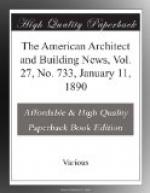THE CATHEDRAL OF ST. MACHAR, ABERDEEN.[5]
“In the bustling manufacturing town which has lately become, and is likely for some time to remain, the extreme northern point of our great system of railway communication, a venerable cathedral, surrounded by tree, with a pleasant river sweeping past it, is scarcely an expected sight. But the two divisions of Aberdeen the old and the new town—are as unlike each other as Canterbury and Manchester. The old town, or ‘Alton,’ as it is locally termed, is not the most ancient part of a city of different periods, around which its modern streets and squares have ramified. It is a distinct hamlet or village, at some distance from the city, and edged away in privacy apart from the great thoroughfares connecting the manufacturing centre with other districts of the country. Its houses are venerable, standing generally in ancient gardens; and save that the beauty and tranquillity of the spot have led to the erection of a few pleasant modern villas, dotting it here and there, whoever treads the one echoing street of the Alton for the first time, feels that two centuries must have brought very little external change to the objects by which he is surrounded. In this pristine place, the short-spiked steeples, and the broad-slated roof of the old cathedral of St. Machar may be seen rising over a cluster of fine old trees which top the sloping bank of the winding Don, from the opposite shore of which the whole scene—comprehending the river, the sloping banks, the trees, and the gray old church—makes a very perfect landscape, rather English than Scottish in its aspect.
“A near approach develops something very peculiar in the character of this edifice. It bears throughout unmistakable marks of age, but none of decay. It is gray with the weather-wearing of centuries, but it displays none of the mouldering vestiges of Time’s decaying fingers; nor yet has it that prim air of good keeping which shows, in treasured antiquities, that careful hands have sedulously restored each feature that age may have injured. It is clear that the completeness of detail—the clean outlines, the hard, unworn surfaces—are characteristics of innate strength, and connect themselves with the causes of a certain northern sternness and rigidity in the general architectural designs.
“The secret of all these peculiarities is to be found in the nature of the material, which is granite—the same that has handed down to us, through thousands of years, the cold, stony eyes of the sphynx, precisely as the chisel last touched them—and retains, to the wonder of the Londoners, the glittering lustre of the polished cheeks of Rameses. The stern nature of the primitive rock—obdurate alike to the chisel and to time—has entirely governed the character of the architecture; and, while it has precluded lightness and decoration, has given opportunities for a certain gloomy dignity. About




